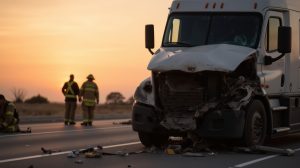Unique Legal Challenges in North Dakota Trucking Accident Cases
 You’ve shared the road with those towering semis and 18-wheelers barreling down the highway countless times. However, when something goes wrong, and one of those trucks collides with your vehicle, the consequences can be devastating. The injuries are often life-altering and the legal process you’re forced to go through is even more complex.
You’ve shared the road with those towering semis and 18-wheelers barreling down the highway countless times. However, when something goes wrong, and one of those trucks collides with your vehicle, the consequences can be devastating. The injuries are often life-altering and the legal process you’re forced to go through is even more complex.
If you’ve been in a trucking accident in North Dakota, you already know there’s more involved than dealing with a conventional car crash. These cases are bigger, more complicated, and more technical. And if you’re going to recover compensation, you’ll need to understand why these cases demand a different kind of legal approach.
Let’s unpack what makes North Dakota trucking accidents so unique and what you need to know to protect yourself.
Why trucking accident cases are more complex than car crashes
Trucking accidents involve massive vehicles, usually traveling at high speeds. That alone increases the severity of injuries and the complexity of the crash itself. But the legal challenges run much deeper.
Here’s why:
- You’re not just dealing with a driver. You may be up against a national trucking company, a cargo shipper, or a maintenance contractor.
- You’re not just looking at traffic laws. You’ve also got federal trucking regulations layered over North Dakota’s state statutes.
- And you’re not just trying to prove negligence. You’re often battling corporate defense lawyers and aggressive insurance teams trained to minimize your payout.
That’s why having an experienced truck accident lawyer matters. Someone who knows the terrain, both literally and legally.
Rural roads, long hauls, and high stakes
North Dakota’s geography plays a big role in these cases. Our highways stretch across hundreds of miles of farmland, oil country, and snow-prone corridors. Many of the state’s most serious truck accidents happen on:
- US-2, cutting across the north from Williston to Grand Forks
- I-94, running east to west through Bismarck and Fargo
- Other major roads like I-29 and US 85
- State highways in rural counties with limited lighting, icy conditions, or narrow shoulders
When crashes happen out here, response times may be slower, road conditions harder to assess, and evidence more likely to be disturbed before it’s properly documented.
If your crash occurred in a remote part of the state, it’s essential to act quickly. Gather witness accounts, preserve tire marks, and secure data before it disappears.
Identifying all liable parties
One of the first legal challenges in a truck accident is figuring out who’s actually responsible. It’s rarely just the driver. In fact, there could be multiple entities involved, each with their own insurance and legal team.
Here’s who might be on the hook:
- The truck driver – for speeding, fatigue, or distracted driving
- The trucking company – for negligent hiring, training failures, or forcing unrealistic schedules
- The cargo loader – if improperly secured freight caused the crash
- A maintenance contractor – if brake failure or tire blowouts were due to poor upkeep
- The truck manufacturer – if a mechanical defect played a role
A skilled truck accident lawyer will investigate every possible source of liability. The more parties you can hold accountable, the more resources are available for your recovery.
Preserving black box data and driver logs
Unlike a typical car crash, truck accidents involve a wealth of electronic data, if you know how to get it.
Two critical pieces of evidence:
1. The “black box”
Also known as the ECM (Electronic Control Module), this device records vehicle speed, braking, throttle usage, and sometimes even steering inputs in the moments leading up to the crash.
2. Driver’s logs and Hours of Service (HOS) records
Federal law limits how long commercial drivers can operate without rest. If the driver was over hours, fatigued, or falsifying logs, it could be a major factor in your case.
However, here’s the catch: this data can disappear quickly.
Under federal rules, some trucking companies can legally destroy driver logs after just six months. If you don’t act fast, important evidence could vanish.
That’s why a truck accident lawyer will often send a “spoliation letter” right away, legally demanding that the trucking company preserve all relevant records.
Understanding federal and state regulations
In North Dakota, truck drivers and companies must follow state traffic laws, but they’re also subject to federal trucking regulations under the Federal Motor Carrier Safety Administration (FMCSA).
Some key rules that can affect your case:
- Hours of Service (HOS) – to prevent driver fatigue
- Drug and alcohol testing requirements – before and after accidents
- Vehicle maintenance standards – including inspection logs
- Cargo securement rules – to prevent shifting loads
- Insurance minimums – often much higher than personal auto policies
Violations of these rules can help prove negligence and, in rare cases, may support punitive damages (exemplary damages) if there is clear and convincing evidence that the company acted with reckless disregard for safety.
Dealing with aggressive insurance tactics
You’d think with all these regulations, trucking companies would just accept responsibility and pay what’s fair. That rarely happens.
Most commercial carriers have teams of adjusters and defense attorneys whose job is to minimize liability. They may:
- Show up at the scene before the police finish their report
- Offer a lowball settlement while you’re still in the hospital
- Deny fault entirely, claiming you “cut off the truck”
- Blame weather, other drivers, or even pedestrians
- Dispute the severity of your injuries
They’re not playing fair, and they’re hoping you won’t notice. However, a truck accident lawyer knows how to spot these tactics and push back.
Why truck crash injuries are often more severe
It’s simple physics. An 80,000-pound truck hitting a 3,000-pound car isn’t a fair fight.
That’s why truck accidents often involve:
- Traumatic brain injuries (TBIs)
- Spinal cord injuries and paralysis
- Crushed limbs or amputations
- Severe burns from fuel tank explosions
- Internal bleeding and organ damage
These aren’t the kind of injuries you bounce back from in a few weeks, and insurance companies know that. They also know that the more serious your injury, the more money is on the line.
That’s why case valuation is so important in trucking crashes. A good lawyer will work with medical experts, life care planners, and economists to show the true cost of your injuries years from now.
What a North Dakota truck accident lawyer can do for you
If you’re thinking about handling a trucking claim on your own, consider this: the other side already has a head start. They’ve got a team of professionals who handle these cases every day.
Here’s what your lawyer can do:
- Investigate the crash, starting with black box data and logbooks
- Identify every liable party (and every policy that could apply)
- Work with crash reconstruction experts to explain what happened
- Handle all negotiations with insurers and trucking company lawyers
- Build a case that fully accounts for your medical needs, lost wages, and pain
At Larson Law, we’ve seen what happens when trucking companies get reckless, and we’ve helped clients across North Dakota hold them accountable.
We know the highways. We know the laws. And we know how to fight for families when the stakes are this high.
Don’t let trucking companies off the hook
Not all vehicle accidents are the same and neither are the legal strategies for handling them.
Trucking accidents in North Dakota bring a unique blend of rural road realities, federal regulations, and high-powered corporate defense. But you don’t have to go into that fight alone.
Contact Larson Law today to speak with an experienced truck accident lawyer who knows North Dakota roads and how to handle the legal challenges that follow a serious crash.

Mark Larson is a Certified Civil Trial Specialist and Certified Civil Pre-Trial Specialist focusing on personal injury, car accidents, wrongful death, and oil field claims. Since 1979, Larson Law has served the injured throughout North Dakota. Read more about Mark V. Larson.
